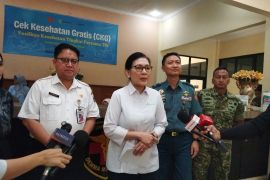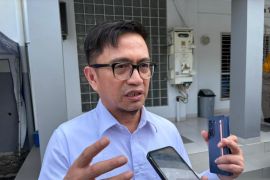“Early detection can be conducted at the nearest health facility, such as the community health center (puskesmas), clinic, hospitals, and Advanced Referral Health Facilities (FKRTL) at the district or city level," the ministry's director of prevention and control of non-communicable diseases, Eva Susanti, said in Jakarta, Monday (February 13).
Susanti remarked that early detection tools for cancer screening aimed at providing better health services for cancer patients. The distribution was also conducted by utilizing capabilities of the existing hospital network in Indonesia.
In order to improve health services for cancer patients, the ministry also provides scholarships for cancer specialists and provides training for general practitioners, nurses, and midwives at the FKRTL level.
Along with the training center, this year, the Health Ministry is also conducting training and education for cancer experts in Indonesia, Susanti remarked.
Susanti noted that through cross-sectoral involvement in disseminating cancer-related information in order to minimize the risk of matters worsening in society, the ministry is conducting training for around 1,500 cadres, who will later be integrated into community health services.
"These cadres will reach out to the community because we want to introduce cancer detection to those in the age group of 15 to 59 years. In 2023, we want to achieve 70 percent of our target," she affirmed.
On the other hand, the Ministry of Health appointed the Jakarta Dharmais Cancer Hospital as the administrator for the hospital network in Indonesia. The hospital has also collaborated with foreign universities to develop cancer services across Indonesia.
Susanti explained that starting in 2023, the Ministry of Health will improve early detection of cervical cancer not only through the IVA test but also HPV testing that relies on PCR test kits owned by each district and city.
"At this early stage, we are conducting eight thousand tests in Jakarta Province. Why Jakarta? Because it is easier for us to implement it with well-equipped health personnel. In future, we will conduct it in all provinces as well," she remarked.
In addition, the Ministry of Health is keen that the coverage of examinations through the IVA test for cervical cancer runs better since so far, only some 12 percent of the total target are willing to undergo early detection examinations.
Despite the government's myriad efforts through both the education side and the provision of the most advanced technology, Susanti believes that all efforts would prove futile if the community failed to actively undergo regular health checkups.
"(This is) especially (important) for Indonesian women, (as) they must have the awareness to undergo health checks, especially for early detection of this cancer because health is something that only they themselves can take care of. This means that they must have the initiative to undergo the examination," she emphasized.
Related news: Indonesians urged to seek information on early prevention of cancer
Related news: Bio Farma diagnostic tool uses urine to detect cervical cancer
Translator: Hreeloita Dharma S, Resinta S
Editor: Tia Mutiasari
Copyright © ANTARA 2023












